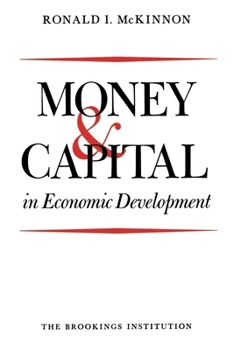Money and Capital in Economic Development
Select Format
Select Condition 
Book Overview
This books presents a theory of economic development very different from the ""stages of growth"" hypothesis or strategies emphasizing foreign aid, trade, or regional association. Leaving these aside, the author breaks new ground by focusing on the use of domestic capital markets to stimulate economic performance. He suggests a ""bootstrap"" approach in which successful development would depend largely on policy choices made by national authorities in the developing countries themselves.
Central to his theory is the freeing of domestic financial markets to allow interest rates to reflect the true scarcity of capital in a developing economy. His analysis leads to a critique of prevailing monetary theory and to a new view of the relation between money and physical capital--a view with policy implications for governments striving to overcome the vicious circle of inflation and stagnation. Examining the performance of South Korea, Taiwan, Brazil, and other countries, the author suggests that their success or failure has depended primarily on steps taken in the monetary sector. He concludes that monetary reform should take precedence over other development measures, such as tariff and tax reform or the encouragement of foreign capital investment. In addition to challenging much of the conventional wisdom of development, the author's revision of accepted monetary theory may be relevant for mature economies that face monetary problems.
"




